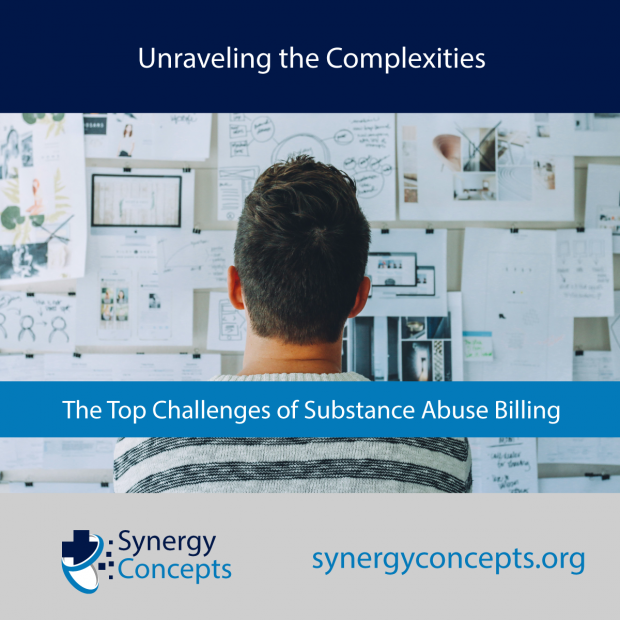Navigating the complexities of substance abuse billing can be overwhelming for healthcare professionals. From understanding insurance reimbursement policies to complying with evolving regulations, the challenges in this field are numerous. In this article, we will explore the top challenges of substance abuse billing and provide insights into how healthcare providers can overcome them.
One of the primary challenges is the constantly changing landscape of insurance policies and regulations. It can be a daunting task to keep up with the updates and ensure accurate billing. Additionally, insurance denials and claim rejections are common in the substance abuse billing process, leading to delayed payments and cash flow issues.
Another challenge is maintaining compliance with HIPAA regulations while dealing with sensitive patient information. The need for strict confidentiality in substance abuse treatment adds another layer of complexity to the billing process.
Furthermore, managing billing disputes, identifying and correcting coding errors, and staying up-to-date with coding changes are all ongoing challenges that healthcare providers face in substance abuse billing.
Throughout this article, we will delve into each of these challenges, providing practical tips and solutions to help streamline the substance abuse billing process and ensure financial stability for healthcare practices.
Understanding the Complexities of Substance Abuse Billing
Substance abuse billing is a complex process that requires a deep understanding of insurance policies, coding guidelines, and regulatory requirements. Healthcare providers need to stay up-to-date with the latest changes in insurance reimbursement policies and navigate the intricate landscape of billing procedures.
One of the primary challenges is the constantly changing landscape of insurance policies and regulations. It can be a daunting task to keep up with the updates and ensure accurate billing. Additionally, insurance denials and claim rejections are common in the substance abuse billing process, leading to delayed payments and cash flow issues.
To overcome this challenge, healthcare providers should invest in ongoing training and education for their billing staff. By staying informed about the latest changes in insurance policies and regulations, the billing team can ensure accurate billing and minimize claim denials. Implementing a robust system for insurance verification and pre-authorization can also help prevent claim rejections and ensure timely reimbursement.
Common Challenges in Substance Abuse Billing
Substance abuse billing comes with its own set of unique challenges. From documentation and coding issues to compliance and regulatory hurdles, healthcare providers face a range of obstacles in this field. In this section, we will discuss some of the most common challenges and provide practical solutions to help healthcare practices overcome them.
Insurance Verification and Pre-authorization Issues
Verifying insurance coverage and obtaining pre-authorization for substance abuse treatment can be a time-consuming process. In many cases, insurance companies have strict requirements and documentation criteria that must be met before they approve treatment. Failure to complete the verification and pre-authorization process accurately can result in claim denials and delayed payments.
To tackle this challenge, healthcare providers should establish efficient workflows and systems to streamline the insurance verification and pre-authorization process. Investing in software solutions that automate these tasks can significantly reduce administrative burden and ensure accurate and timely approvals. Regularly training the billing staff on insurance verification procedures and staying updated with insurance company requirements can also help minimize claim rejections.
Documentation and Coding Challenges
Accurate and detailed documentation is crucial for successful substance abuse billing. Healthcare providers must ensure that all services provided are clearly documented, including assessments, treatment plans, progress notes, and discharge summaries. Additionally, selecting the appropriate codes for billing is essential for accurate reimbursement. However, documentation and coding errors are common challenges in substance abuse billing.
To address this challenge, healthcare providers should implement comprehensive documentation and coding guidelines. Regular training sessions for clinicians and billing staff can help improve documentation practices and ensure compliance with coding guidelines. It is also advisable to conduct regular audits to identify and correct any coding errors or documentation deficiencies. By maintaining accurate and detailed records, healthcare practices can minimize claim denials and maximize reimbursement.
Denials and Claim Rejections in Substance Abuse Billing
Insurance denials and claim rejections can have a significant impact on the financial stability of healthcare practices. Substance abuse billing often involves complex reimbursement policies, and even small errors or omissions in claims can lead to denials.
To overcome this challenge, healthcare providers should implement a robust denial management process. This involves closely monitoring denied claims, identifying the reasons for denials, and taking appropriate action to appeal or resubmit the claims. Regular communication and collaboration with insurance companies can also help resolve claim rejections and ensure timely reimbursement. Additionally, staying informed about the latest coding changes and guidelines can help minimize claim denials related to coding errors.
Compliance and Regulatory Challenges
Maintaining compliance with HIPAA regulations while dealing with sensitive patient information adds another layer of complexity to the substance abuse billing process. Healthcare providers must ensure the privacy and security of patient data, while also complying with regulations related to electronic health records and billing practices. Failure to comply with these regulations can result in severe penalties and reputational damage.
To address this challenge, healthcare practices should implement comprehensive policies and procedures to safeguard patient information. Regular training and education for staff on HIPAA regulations and best practices for data security can help minimize compliance risks. It is also essential to conduct regular audits and assessments to ensure ongoing compliance. By prioritizing patient privacy and data security, healthcare providers can build trust with their patients and avoid costly penalties.
Staff Training and Education for Effective Substance Abuse Billing
The success of substance abuse billing relies heavily on the knowledge and skills of the billing staff. It is essential to invest in ongoing training and education to ensure that the staff is equipped with the latest information and best practices in billing.
To overcome this challenge, healthcare providers should prioritize staff training and education. This can include workshops, webinars, and online courses that focus on substance abuse billing processes, coding guidelines, and regulatory updates. By empowering the billing staff with the necessary knowledge and skills, healthcare practices can improve billing accuracy, reduce claim denials, and enhance financial stability.
Overcoming Challenges in Substance Abuse Billing
While the challenges in substance abuse billing may seem daunting, healthcare providers can overcome them with the right strategies and tools. By investing in staff training and education, implementing efficient workflows, and staying informed about the latest insurance policies and regulations, healthcare practices can streamline the billing process and ensure financial stability.
It is crucial for healthcare providers to regularly assess their billing processes and identify areas for improvement. Conducting regular audits, seeking feedback from staff and patients, and staying up-to-date with industry trends can help healthcare practices stay ahead of the curve and overcome the challenges in substance abuse billing.
Key Takeaways
Substance abuse billing is a complex and challenging process that requires careful attention to detail and ongoing education. By understanding the unique challenges in this field and implementing practical solutions, healthcare providers can navigate the complexities of substance abuse billing and ensure financial stability for their practices. Prioritizing staff training, establishing efficient workflows, and staying compliant with regulations are key to overcoming the challenges in substance abuse billing. With the right strategies and tools in place, healthcare practices can thrive in this specialized field and provide quality care to individuals in need of substance abuse treatment.
Check out our services and solutions. We’d love to partner with you!













Leave a Reply